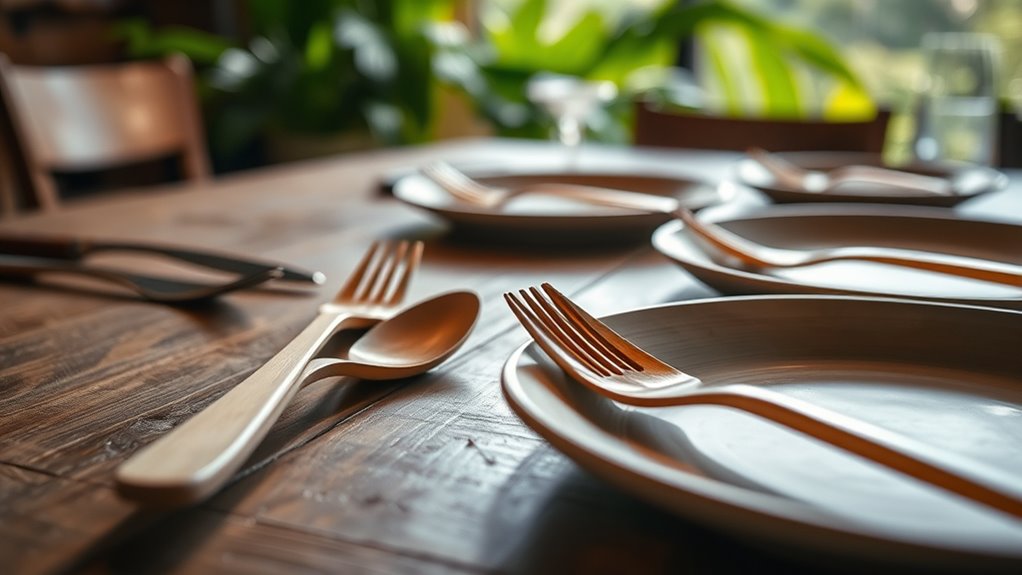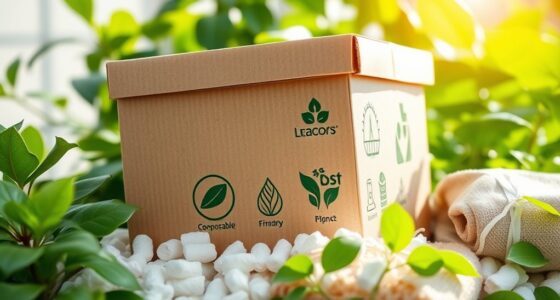Using biodegradable utensils and cutlery helps you cut down plastic waste, protect wildlife, and support eco-friendly habits. Opt for options made from natural fibers like bamboo, wheat straw, or plant-based plastics that decompose quickly in compost. Proper disposal in composting facilities maximizes their environmental benefits, and incorporating these into your daily routine makes sustainability easier. Keep exploring to discover practical tips and materials to make your eco-conscious choices even more impactful.
Key Takeaways
- Opt for compostable utensils made from plant-based materials like cornstarch, bamboo, or sugarcane bagasse for environmentally friendly disposal.
- Properly segregate biodegradable cutlery from non-biodegradable waste and dispose of it in designated composting facilities.
- Keep biodegradable utensils accessible for daily use and outings to encourage consistent eco-friendly habits.
- Educate others on the benefits of biodegradable tableware to promote sustainable practices in communities.
- Ensure correct disposal in composting or biodegradable waste bins to maximize environmental benefits and support circular waste management.
Benefits of Choosing Biodegradable Options
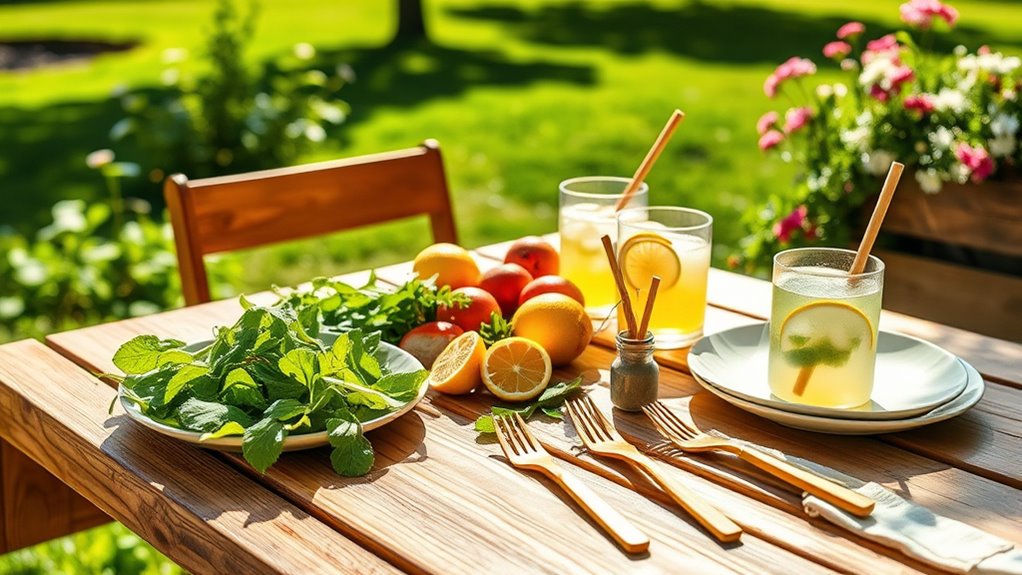
Choosing biodegradable utensils and cutlery offers significant environmental benefits that can’t be ignored. By making this switch, you help reduce plastic waste, which often ends up in landfills and oceans, harming wildlife and ecosystems. These eco-friendly options are typically made from renewable resources, making them a sustainable choice for your events or daily use. When it comes to food safety, biodegradable utensils are often free from harmful chemicals found in some plastics, ensuring your food stays safe. Cost considerations also favor biodegradable options in the long run, as many are competitively priced and reduce cleanup costs associated with waste management. Additionally, choosing biodegradable utensils supports sustainable materials, promoting a healthier planet for future generations. Incorporating environmentally responsible choices into daily habits can amplify positive impacts beyond just utensils. For example, using biodegradable options can also reduce carbon footprint, contributing to overall environmental conservation. Implementing sound design techniques such as layering environmental sounds can help raise awareness about ecological issues. Moreover, the production of biodegradable utensils often involves less energy consumption, which further decreases their environmental impact. Overall, choosing biodegradable utensils not only benefits the environment but also supports safer, more cost-effective practices.
Types of Eco-Friendly Utensils and Cutlery
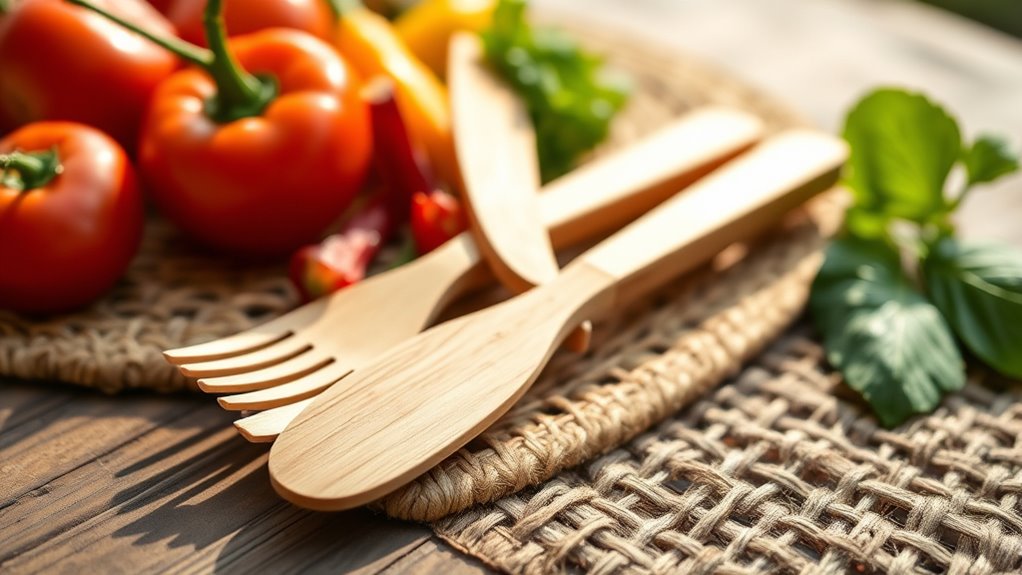
There are several types of eco-friendly utensils and cutlery designed to meet different needs while minimizing environmental impact. You can choose from various options that promote sustainability and reduce waste. Reusable containers made of bamboo or stainless steel are popular for daily use, cutting down on single-use plastics. Compostable cutlery, such as those made from cornstarch or sugarcane bagasse, break down quickly in composting techniques. Wooden utensils are durable and biodegradable, making them ideal for outdoor picnics. Silicone utensils are flexible and reusable, reducing waste over time. When selecting eco-friendly options, consider how they fit into your reusable container system and composting habits, ensuring your choices support a greener lifestyle with minimal environmental footprint. Material choice impacts how easily utensils can be recycled or composted, further enhancing their eco-friendly benefits. Additionally, understanding the lifecycle of these materials helps in making informed decisions about their environmental impact throughout their use. Proper maintenance and mindful disposal of eco-friendly utensils extend their functional lifespan, maximizing sustainability benefits. Incorporating biodegradable materials into your utensils ensures they decompose naturally, reducing landfill accumulation.
How to Properly Dispose of Biodegradable Items
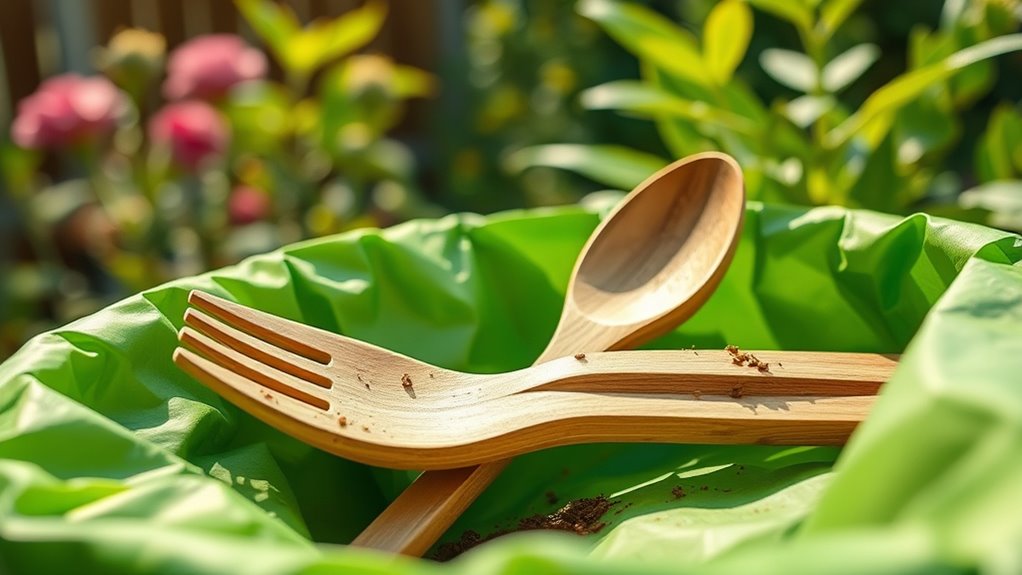
To guarantee biodegradable items break down effectively, you need to dispose of them properly. Start by practicing proper composting whenever possible. Composting turns biodegradable utensils and cutlery into nutrient-rich soil, reducing waste and supporting the environment. Make certain you separate biodegradable waste from regular trash through waste segregation. Place biodegradable items in designated compost bins or compost piles, avoiding disposal with non-biodegradable waste, which can contaminate the compost. Check local guidelines for composting, as some items may require specific conditions. Remember, proper disposal maximizes biodegradability and minimizes environmental impact. Additionally, understanding the costs of various electric bikes can help you choose eco-friendly transportation options that further reduce environmental impact. Proper waste management, including waste segregation, ensures that biodegradable items are processed correctly and efficiently. Incorporating sustainable waste disposal practices can enhance environmental benefits and promote eco-conscious habits. Utilizing composting techniques can further improve the breakdown process and accelerate soil enrichment, especially when combined with homesteading practices that promote sustainable living.
Comparing Biodegradable and Traditional Plastic Utensils
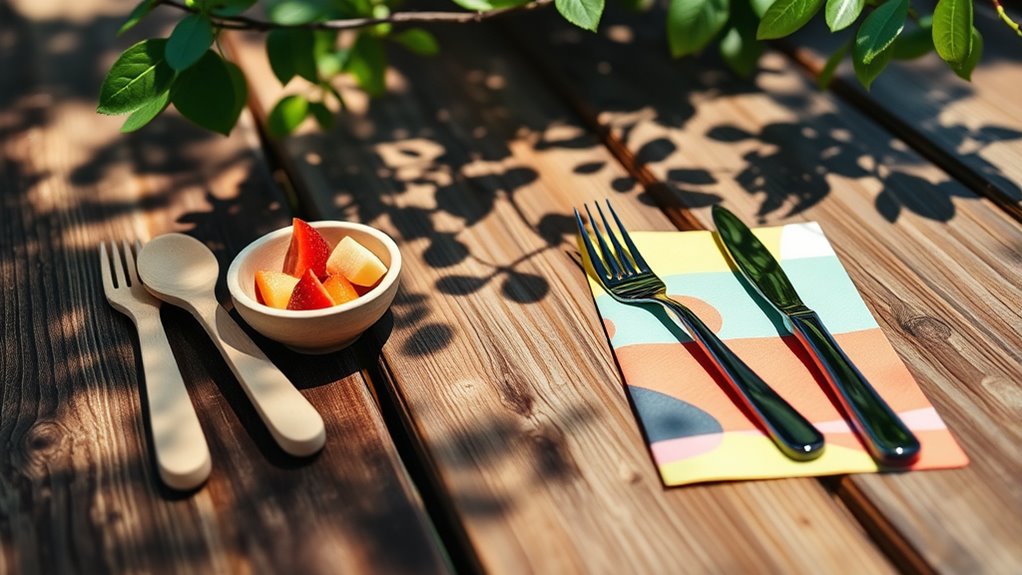
Have you ever wondered how biodegradable utensils compare to traditional plastic ones? Biodegradable options are designed to break down faster, reducing single use conflicts and environmental harm. Unlike plastic, they often come from renewable resources, making their manufacturing processes more sustainable. Here are some key differences:
Biodegradable utensils break down faster and are more eco-friendly than traditional plastics.
- Biodegradable utensils decompose within months, while plastics can take centuries.
- Manufacturing processes for biodegradable items typically consume less energy.
- Plastics contribute considerably to single-use conflicts, polluting oceans and landfills.
- Biodegradable options often have a lower carbon footprint during production.
- Traditional plastics are made from fossil fuels, whereas biodegradable utensils use plant-based materials.
- Composting benefits are also significant, as biodegradable utensils can often be composted at home or in industrial facilities, further reducing waste.
- Additionally, biodegradable utensils reduce the accumulation of persistent pollutants that threaten marine life and ecosystems.
- The use of biodegradable utensils also aligns with a growing trend towards sustainable materials, which is crucial in reducing overall environmental impact.
- Moreover, the adoption of biodegradable utensils encourages eco-conscious behavior, fostering a mindset of environmental responsibility among consumers.
Choosing biodegradable utensils helps minimize waste and supports eco-friendly practices, unlike traditional plastics.
Tips for Incorporating Biodegradable Cutlery Into Daily Life
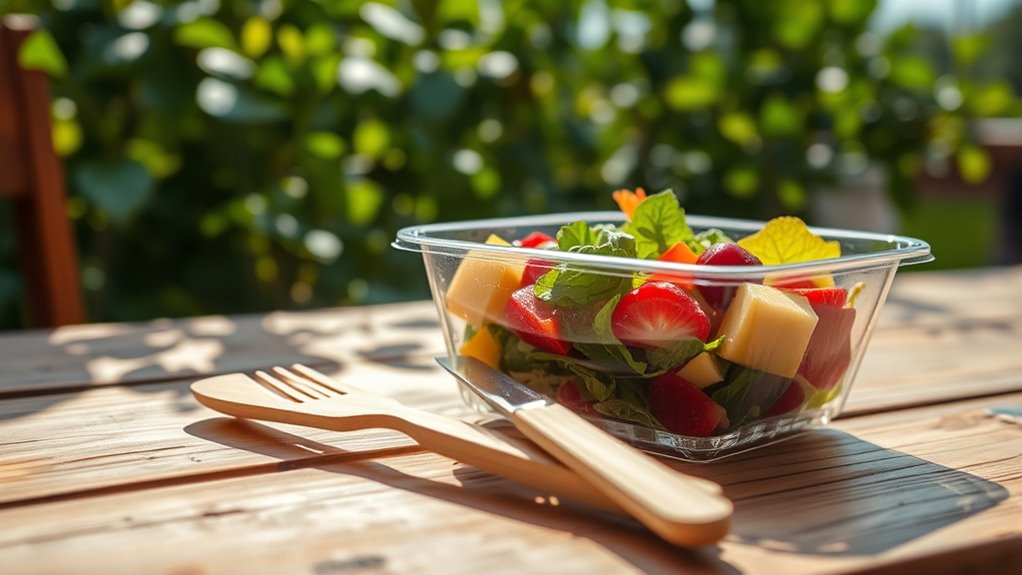
Switching to biodegradable cutlery is easier than you think. Start by keeping a set handy for daily meals and snacks at home. Small changes like these make eco-friendly choices simple and sustainable. Additionally, choosing from a variety of rustic decor resources can inspire eco-conscious travel habits.
Eco-friendly Choices at Home
Incorporating biodegradable cutlery into your daily routine is easier than you might think. To make eco-friendly choices at home, start by using biodegradable utensils for meals and snacks. You can also:
- Participate in local recycling programs that accept biodegradable plastics
- Set up composting techniques for food scraps and compostable cutlery
- Replace plastic utensils in your kitchen with biodegradable options
- Store cutlery in eco-friendly containers for easy access
- Encourage family members to choose biodegradable utensils during meals
Easy Transition Tips
Switching to biodegradable cutlery can be simple when you make small, intentional changes. Start by keeping eco-friendly utensils accessible for daily meals and outings. Respect tableware etiquette by using biodegradable options properly—dispose of them thoughtfully and in designated bins. Be aware of cultural variations; different cultures may have unique customs around utensils, so adapt your approach respectfully. To help progress smoothly, consider this simple guide:
| Tip | Explanation | Example |
|---|---|---|
| Use reusable containers | Carry biodegradable cutlery in your bag | Pack a set for lunch |
| Educate others | Share benefits of eco-friendly tableware | Talk about environmental impact |
| Respect customs | Adjust your usage based on cultural norms | Follow local dining etiquette |
Environmental Impact of Using Biodegradable Products
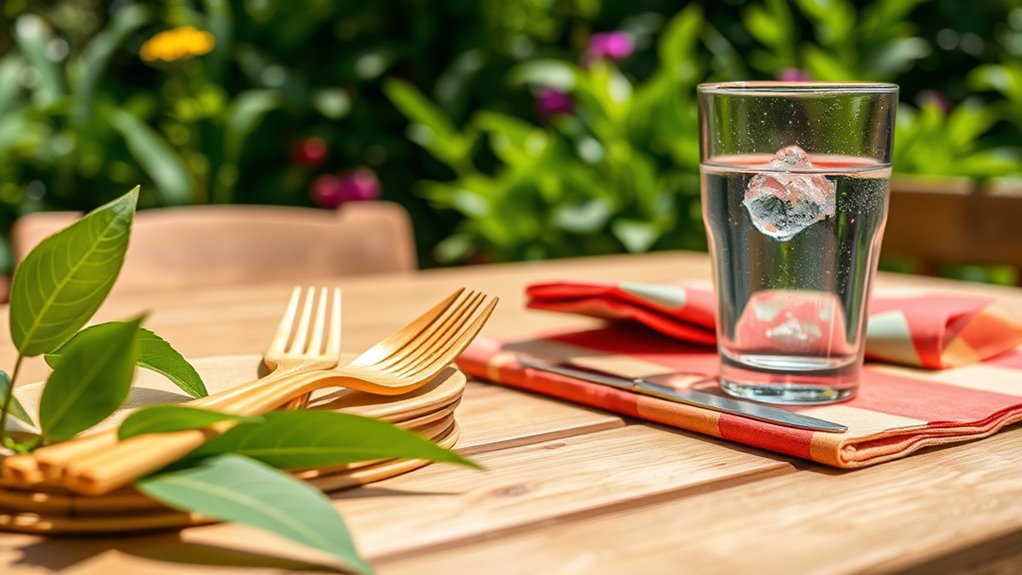
While biodegradable utensils and cutlery are often promoted as eco-friendly alternatives, their environmental impact depends heavily on how they’re produced, used, and disposed of. Proper disposal enhances compostability benefits, allowing these products to break down naturally and enrich soil. However, if not composted correctly, they can linger in landfills, releasing methane and other pollutants. Material sustainability is vital; choosing products made from renewable resources reduces reliance on fossil fuels. To maximize positive impact, guarantee biodegradable items are disposed of in composting facilities rather than regular trash. By doing so, you support a circular lifecycle that minimizes waste.
Proper disposal of biodegradable utensils ensures eco-friendly benefits and reduces landfill pollution.
- Proper disposal ensures full compostability benefits
- Reduces landfill waste and methane emissions
- Promotes renewable resource use
- Enhances soil health through composting
- Supports long-term material sustainability
Popular Materials Used in Biodegradable Utensils
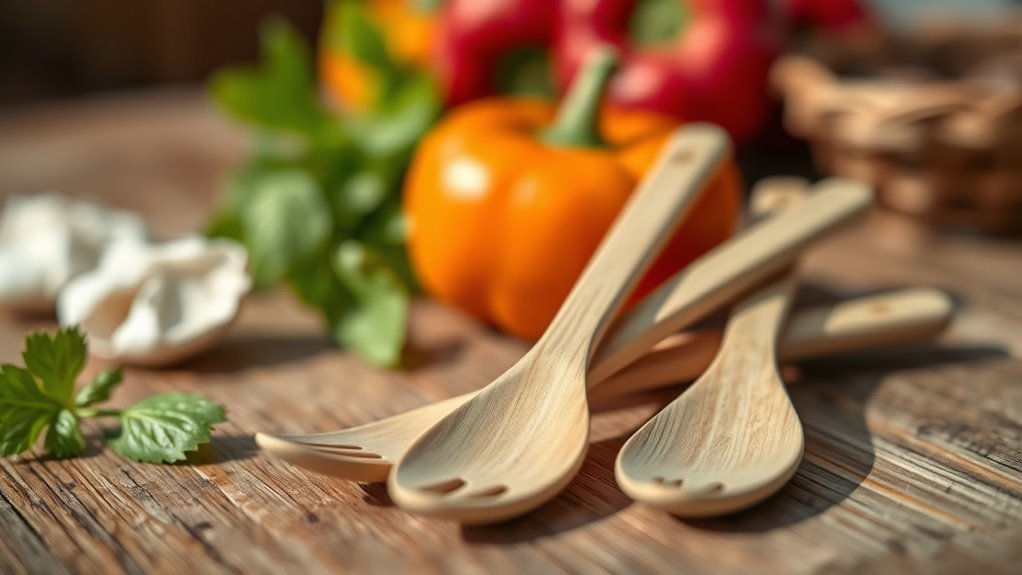
Have you ever wondered what materials make biodegradable utensils environmentally friendly? Many popular options include plant-based plastics and natural fibers, which break down efficiently without harming the environment. Plant-based plastics, derived from renewable resources like cornstarch or sugarcane, offer durability similar to traditional plastics but decompose quickly after disposal. Natural fibers, such as bamboo, wheat straw, or palm leaves, are lightweight, sturdy, and renewable, making them ideal for cutlery and utensils. Here’s a quick comparison:
| Material | Benefits | Decomposition Time |
|---|---|---|
| Plant-based plastics | Durable, renewable, eco-friendly | Weeks to months |
| Natural fibers | Biodegradable, strong, lightweight | Months |
| Composites | Combines benefits of both | Varies |
These materials are leading choices in eco-conscious design.
Frequently Asked Questions
Are Biodegradable Utensils Safe for Hot and Acidic Foods?
You might wonder if biodegradable utensils are safe for hot and acidic foods. Generally, they are, but food safety depends on their material composition. Some biodegradable options, like those made from cornstarch or PLA, can handle hot, acidic foods without leaching harmful substances. Always check the manufacturer’s guidelines to confirm they’re suitable for your intended use, and choose high-quality, certified products to keep your food safe.
How Long Does It Take for Biodegradable Cutlery to Decompose?
The decomposition timeline for biodegradable cutlery varies based on environmental conditions, typically taking anywhere from a few months to a year. You should know that this faster breakdown reduces environmental impact compared to traditional plastics, which can take centuries. To minimize your footprint, choose biodegradable utensils, and dispose of them properly in composting facilities when possible. This way, you help speed up decomposition and support eco-friendly practices.
Can Biodegradable Utensils Be Reused or Washed?
Have you ever wondered if biodegradable utensils can be reused or washed? While many are designed for single-use, some biodegradable cutlery is made from durable materials that allow for washing and limited reusability. To guarantee safety and maintain quality, check the manufacturer’s guidelines. Reusing and washing biodegradable utensils can help reduce waste, but always confirm if the specific type you’re using supports these practices without compromising its eco-friendly qualities.
Are There Any Health Concerns With Biodegradable Materials?
You might wonder if biodegradable materials pose health risks. Generally, they’re safe, but it’s good to take into account chemical safety, as some may contain additives or dyes that could cause allergies or sensitivities. Always check labels for allergen information and certifications. If you have allergies, choose products that specify allergy considerations and avoid any with questionable chemical safety. Staying informed helps you enjoy eco-friendly options without health worries.
What Certifications Should I Look for When Buying Biodegradable Utensils?
When choosing biodegradable utensils, you should look for certification standards and eco labels that verify their environmentally friendly claims. These certifications guarantee the products meet safety, biodegradability, and sustainability criteria. By checking for reputable eco labels, you can confidently select utensils that are truly biodegradable and align with your eco-conscious values. Always verify the certifications on packaging to guarantee you’re making an environmentally responsible choice.
Conclusion
By choosing biodegradable utensils, you’re not just making a small switch – you’re planting a seed for a healthier planet. Imagine your daily habits as the brushstrokes on a canvas of change, creating a vibrant, sustainable masterpiece. Every eco-friendly choice adds color and life to our world. So, embrace biodegradable cutlery and let your actions speak louder than words, proving that even the tiniest act can bloom into a powerful movement for the environment.
